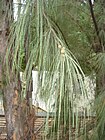Note: This is a project under development. The articles on this wiki are just being initiated and broadly incomplete. You can Help creating new pages.
Difference between revisions of "Casuarina equisetifolia"
(→References) |
(→Leaf) |
||
| Line 33: | Line 33: | ||
==Identification== | ==Identification== | ||
===Leaf=== | ===Leaf=== | ||
| − | {{Leaf|||}} | + | {{Leaf|||}} |
===Flower=== | ===Flower=== | ||
Revision as of 14:27, 17 August 2021
Casuarina equisetifolia is an evergreen tree with a finely branched, feathery crown, usually growing from 6 to 35 metres tall. The straight, cylindrical bole can be free of branches for 10 metres or more and 20 - 100cm in diameter.
Contents
- 1 Uses
- 2 Parts Used
- 3 Chemical Composition
- 4 Common names
- 5 Properties
- 6 Habit
- 7 Identification
- 8 List of Ayurvedic medicine in which the herb is used
- 9 Where to get the saplings
- 10 Mode of Propagation
- 11 How to plant/cultivate
- 12 Commonly seen growing in areas
- 13 Photo Gallery
- 14 References
- 15 External Links
Uses
Dysentery, Diarrhoea, Stomachache, Swelling.
Parts Used
Bark.
Chemical Composition
Common names
| Language | Common name |
|---|---|
| Kannada | Kesarike, Gaalimara |
| Hindi | Jaunglijaan |
| Malayalam | Chavuku |
| Tamil | Savukkumaram |
| Telugu | Saruku |
| Marathi | NA |
| Gujarathi | NA |
| Punjabi | NA |
| Kashmiri | NA |
| Sanskrit | NA |
| English | Hourse tail tree |
Properties
Reference: Dravya - Substance, Rasa - Taste, Guna - Qualities, Veerya - Potency, Vipaka - Post-digesion effect, Karma - Pharmacological activity, Prabhava - Therepeutics.
Dravya
Rasa
Guna
Veerya
Vipaka
Karma
Prabhava
Habit
Identification
Leaf
| Kind | Shape | Feature |
|---|---|---|
Flower
| Type | Size | Color and composition | Stamen | More information |
|---|---|---|---|---|
| Flowering season is August-Septemeber |
Fruit
| Type | Size | Mass | Appearance | Seeds | More information |
|---|---|---|---|---|---|
| Fruiting season is August-Septemeber |
Other features
List of Ayurvedic medicine in which the herb is used
Where to get the saplings
Mode of Propagation
How to plant/cultivate
Common ru is adaptable to a wide range of conditions, being found from the semi-arid to subhumid tropics and subtropics, usually near sea level but succeeding under cultivation at heights up to 1,400 metres.[3]
Commonly seen growing in areas
Found on sand dunes, Inland to lower hills.
Photo Gallery
References
- ↑ [Chemistry]
- ↑ Karnataka Medicinal Plants Volume - 2 by Dr.M. R. Gurudeva, Page No. 695
- ↑ Cultivation
External Links
- Ayurvedic Herbs known to be helpful to treat Dysentery
- Ayurvedic Herbs known to be helpful to treat Diarrhoea
- Ayurvedic Herbs known to be helpful to treat Stomachache
- Ayurvedic Herbs known to be helpful to treat Swelling
- Herbs with Bark used in medicine
- Herbs with common name in Kannada
- Herbs with common name in Hindi
- Herbs with common name in Malayalam
- Herbs with common name in Tamil
- Herbs with common name in Telugu
- Herbs with common name in English
- Habit - Evergreen tree
- Index of Plants which can be propagated by Seeds
- Index of Plants which can be propagated by Cuttings
- Herbs that are commonly seen in the region of Found on sand dunes
- Herbs that are commonly seen in the region of Inland to lower hills
- Herbs
- Pages without herbs images





